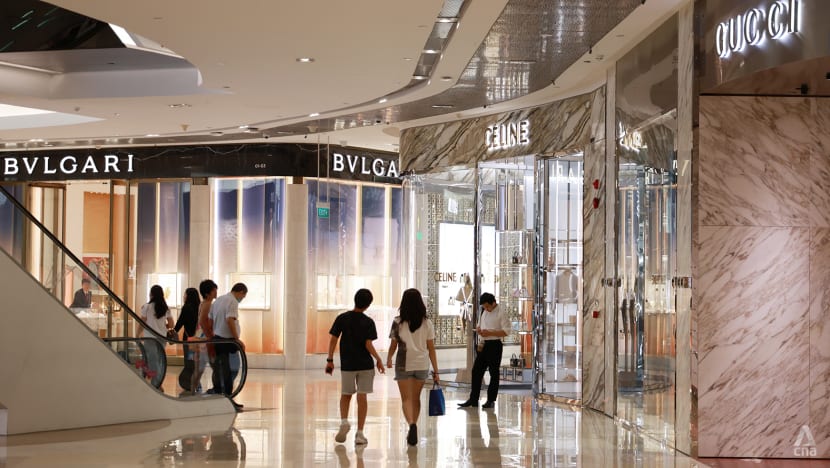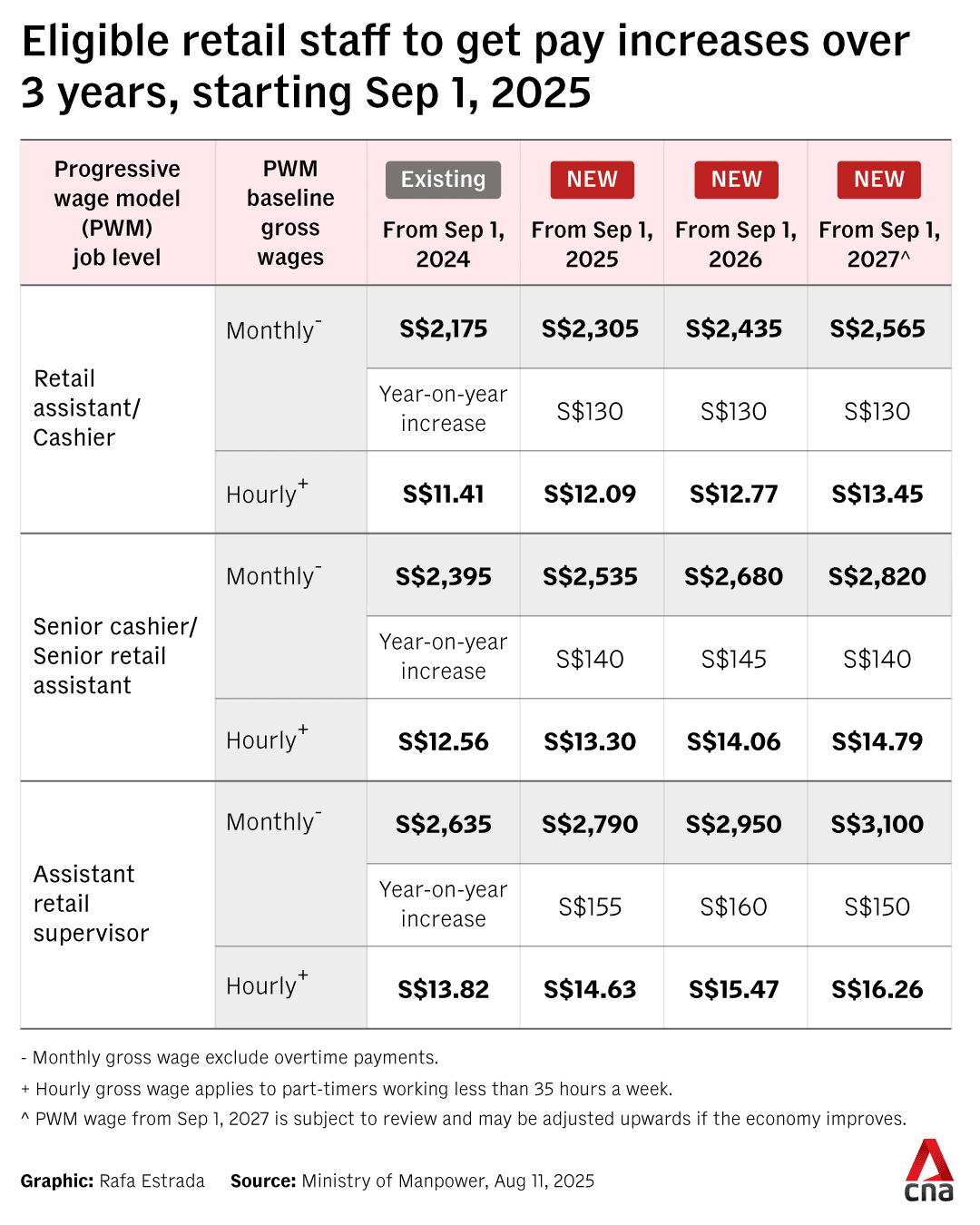Retail workers eligible for new round of pay increases under Progressive Wage Model
With government co-funding to buffer the wage increases, there is "no reason" for employers to pass on the full costs to customers directly, says Minister of State for Manpower Dinesh Vasu Dash.

A scene in Ion Orchard mall along Singapore's Orchard Road shopping belt. (Photo: CNA/Raj Nadarajan)

This audio is generated by an AI tool.
SINGAPORE: The government has accepted recommendations on the Progressive Wage Model (PWM) for the retail sector, which set out a three-year schedule of sustained wage increases for workers.
The new schedule will apply to more than 53,000 resident full-time and part-time retail workers from Sep 1, 2025 to Aug 31, 2028, said the Ministry of Manpower (MOM) on Monday (Aug 11).
It is part of the recommendations made by the Tripartite Cluster for Retail (TCR), which also outlined an "expanded list of training modules" and recognition of Institute of Higher Learning (IHL) qualifications to meet the minimum training requirements.
The Progressive Wage Model for the retail sector has been in place since Sep 1, 2022. The current wage schedule was set for three years until Aug 31, 2025.
Under the current plan, wages went up by 8.4 per cent to 8.5 per cent annually. In dollars, the increments in monthly gross wages ranged from S$125 to S$240.
The TCR said the wage increments in the new PWM, which range from S$130 to S$160, were a "more modest and sustainable increase".
The TCR began its mid-term review in 2024 and conducted several rounds of consultations before releasing its recommendations on Monday.

WAGE INCREASES
From Sep 1, eligible entry-level retail workers such as cashiers and retail assistants will see their monthly gross wages increase from S$2,175 (US$1,690) to S$2,305. This baseline wage will rise annually by S$130 to S$2,565 from Sep 1, 2027.
The hourly wage of entry-level retail workers, which applies to part-timers who work less than 35 hours a week, will also increase accordingly, from S$11.41 to S$12.09 next month, to S$13.45 from Sep 1, 2027.
Under the plan, monthly wages for senior cashiers and senior retail assistants will rise from S$2,395 to S$2,535 next month, then to S$2,680 in 2026, and S$2,820 in 2027.
These workers will receive annual wage increases of either S$140 or S$145, while those who work hourly will see their gross wages rise from S$12.56 to S$13.30 next month, and continue to increase over the following two years.
Meanwhile, assistant retail supervisors will see their monthly wages rise by S$155 in September, S$160 in 2026 and S$150 in 2027, while their hourly wages will climb from S$13.82 to S$16.26 over the three-year period.
The wages in the third year of implementation - starting Sep 1, 2027 - are subject to review in 2026. They may be raised if the economic situation improves, said MOM.
Minister of State for Manpower Dinesh Vasu Dash said the new PWM schedule takes into consideration uncertainties in the global environment.
He said the government is watching the economic outlook very closely, pointing to the trade sector in particular.
"If there's a requirement for us to make further changes along the way, we will consider that as well," said Mr Dinesh.
He added that the new three-year wage schedule was an opportunity for retailers to look at their business processes and find ways to be more efficient and productive, while uplifting workers' skills.
Asked about the possibility of retailers passing on the cost of progressive wages to customers, Mr Dinesh said that government co-funding provided "buffers".
"This will defray costs that the employers will have to bear themselves. So there's no reason for employers to be sending the full extent of the increase of wages to the customers directly," he said.
"CHALLENGING" RETAIL ENVIRONMENT
In a statement, the TCR said the recommendations come against a "challenging" backdrop for the retail sector.
"Brick-and-mortar shops are experiencing shrinking footfall due to growing competition from e-commerce platforms and overseas retail alternatives, especially with the upcoming Johor Bahru-Singapore Rapid Transit System (RTS) Link in 2026," it added.
TCR chair and National Trades Union Congress (NTUC) assistant secretary-general Yeo Wan Ling also said the recommendations aim to reshape the perceptions of retail jobs and position it as a "dynamic sector with meaningful, long-term career opportunities for Singaporeans".
When the PWM was introduced in 2022, it covered about 46,000 retail workers. Ms Yeo pointed out that the new wage schedule will apply to about 7,000 more retail workers who have entered the sector since the PWM was implemented.
Calling this a "good outcome", she said that part of the reason for implementing the PWM was "to make the retail industry a much brighter one with better career prospects for workers".
She noted that since the PWM for the retail sector was introduced, some roles like cashiers had started to vanish, while more retail workers were undergoing skills training to take on other roles instead.
Ms Yeo added that the RTS Link could also create new jobs, such as cross-border roles, and that the question was how to prepare workers for them.
The recommendations were developed after extensive engagement with key stakeholders, including retail employers, NTUC’s affiliated unions, industry associations and workers.
With other factors such as rising operational costs and manpower shortages affecting the local retail sector, TCR said it has taken a "balanced and pragmatic" approach in its recommendations.
"This integrated approach aims to support business sustainability while enabling workers to grow in skills, responsibilities and wages in tandem with industry transformation."
On the increased hourly rates, TCR said it helps to ensure that part-time workers are fairly compensated based on the same PWM structure as their full-time counterparts.
CO-FUNDING SUPPORT, GREATER RECOGNITION
To help cushion the PWM wage increases, eligible employers will automatically receive co-funding support under the Progressive Wage Credit Scheme (PWCS) until 2026, said MOM.
"The PWCS will co-fund up to 40 per cent of wage increases given to lower-wage workers in 2025, and 20 per cent in 2026."
Under the scheme, which was introduced in 2022, the government pays for part of the wage increase that an employer gives to workers.
MOM said the co-funding will help in alleviating cost pressures while "enabling business to drive transformation efforts to enhance productivity and raise wages sustainably".
The TCR also recommended expanding the list of training modules and recognising qualifications from Institutes of Higher Learning (IHLs) to meet the minimum training requirements under the Retail Progressive Wage Model (PWM).
Retail workers who hold relevant qualifications from Institutes of Higher Learning (IHLs), such as Ngee Ann Polytechnic, Republic Polytechnic and Nanyang Polytechnic, will be recognised as having met the minimum PWM training requirements.
Those who have attained the Institute of Technical Education (ITE) skills subject certificate in retail & e-commerce will also be considered to have fulfilled the requirement.
TCR noted that the move aims to provide retail workers with more accessible and diverse pathways to meet training requirements, while also acknowledging prior learning and industry-relevant credentials.
"With more recognised training options, workers can upskill more efficiently and confidently pursue career advancement within the sector," it said.
"This strengthens their employability and opens doors to higher paying roles by enabling them to keep pace with an industry that is becoming increasingly digital and customer centric."



















